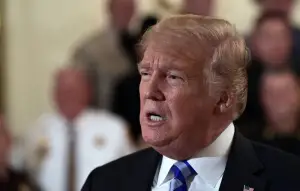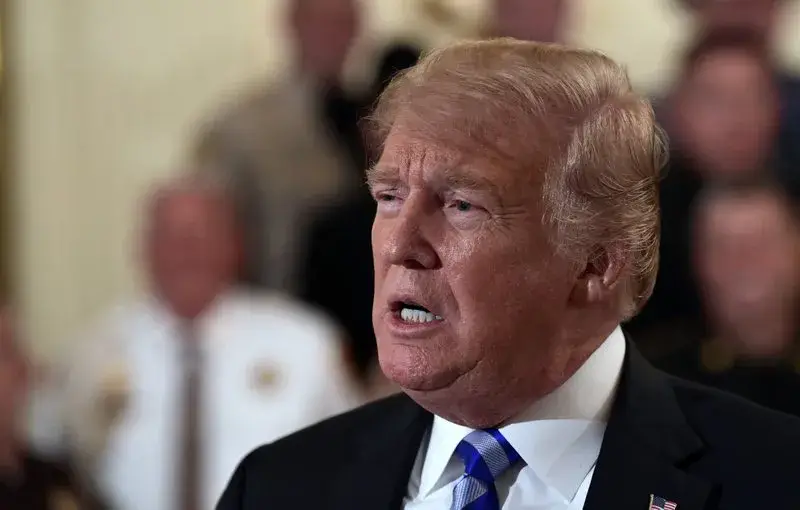In a bombshell statement that has reignited debates over royal privileges and immigration, President Donald Trump has declared he “does not want” to deport Prince Harry from the United States—a decision he attributes, in part, to his warm relationship with King Charles III and his deep respect for the Royal Family.
A Royal Reason for Leaving Harry in the U.S.
Speaking on Truth Social, the 78-year-old Republican leader delivered his view on the ongoing controversy surrounding Prince Harry’s immigration status. According to an insider report from The Sun, Trump believes that deporting Harry from his luxurious Montecito home would cause significant complications. The source explained that Trump is aware of the practical difficulties: “The President knows that if he were to deport Harry from California and his 14-bathroom mansion, the 40-year-old royal would have nowhere to go, causing a headache for the King.” In Trump’s view, keeping Prince Harry in the United States is, paradoxically, the less problematic option.
One source added, “Having him back in the UK is actually harder than having him kept away in the USA,” suggesting that the logistical and diplomatic fallout from deporting a high-profile member of the Royal Family would be enormous.
The Immigration Controversy
The issue of Prince Harry’s immigration status has been a topic of discussion for some time. The Heritage Foundation recently questioned whether Harry might have concealed past illegal drug use—details he candidly discussed in his 2023 memoir Spare. In his memoir, Harry admitted to experimenting with cocaine, cannabis, and psychedelic mushrooms, beginning at age 17 following the tragic death of his mother, Princess Diana. While these revelations have sparked debates about his eligibility for a U.S. visa, Trump’s comments suggest that, regardless of past controversies, his decision on deportation is ultimately influenced by his personal connections to the British Royal Family.
A Jab at Meghan Markle
No discussion about Prince Harry and his ties to the UK would be complete without mentioning Meghan Markle. President Trump, who has been known to criticize Markle in the past, took the opportunity to launch a jab at her. When asked if he wanted to deport Prince Harry, Trump added, “I’ll leave him alone. He’s got enough problems with his wife. She’s terrible.” This remark, delivered in his characteristic blunt style, underscores Trump’s longstanding feud with Meghan Markle—a conflict that has played out publicly over the years.
Meghan, who has been openly critical of Trump—describing him as ‘divisive’ and a ‘misogynist’—also supported his Democratic opponent, Hillary Clinton, during the 2016 election. Despite Trump’s previous attempts to downplay any animosity—claiming he didn’t know Meghan was “nasty” after her reported comments—his latest quip reinforces the ongoing personal and political rift between him and the Duchess of Sussex.
A Political Statement with International Implications
Trump’s statement about Prince Harry is not merely about immigration policy; it also carries significant international and diplomatic undertones. By invoking King Charles III and the Royal Family, Trump positions himself as a defender of traditional alliances and respect for longstanding institutions. His comments imply that his favorable view of the British monarchy outweighs any criticisms related to Harry’s past or his current behavior.
This statement comes at a time when discussions about immigration, celebrity, and royal privilege continue to intersect in unexpected ways. While some see Trump’s remarks as a calculated move to maintain positive relations with the British establishment, others view them as an opportunistic jab intended to stoke controversy among his critics.
Reactions from the Public and Media
Unsurprisingly, Trump’s latest comment has sparked a flurry of reactions on social media. Supporters of the president have applauded his stance, praising his commitment to preserving a “warm relationship” with the Royal Family. Detractors, however, have condemned his remarks as outdated and unnecessarily personal, arguing that issues of immigration and eligibility should be addressed based on legal merits rather than royal favor.
One vocal critic on Twitter remarked, “The president should focus on solving real problems, not playing favorites with royals.” Meanwhile, a supporter countered, “Keeping Prince Harry in the US avoids a royal headache, and that’s practical leadership.” These differing opinions highlight the polarized nature of public discourse when it comes to the intersection of politics, celebrity, and international relations.

The Broader Debate Over Immigration and Accountability
Trump’s comment also ties into a broader narrative regarding immigration policies and accountability. For many, the question of whether public figures should face scrutiny for past behaviors—such as Prince Harry’s drug use—remains contentious. The Heritage Foundation’s concerns about Harry’s immigration history add another layer of complexity to the debate. Yet, for Trump, the decision not to deport Harry seems to rest on pragmatic grounds, underscoring a desire to avoid the diplomatic fallout that might result from sending a member of the Royal Family back to the United Kingdom.
In essence, Trump’s statement reflects a multifaceted approach to governance, one that blends policy with personal preference and international diplomacy. Whether one agrees with his reasoning or not, his comments serve as a reminder that in the realm of high-stakes politics, decisions are rarely made on purely technical grounds—they are often influenced by a complex web of relationships, traditions, and public perceptions.

Donald Trump previously stated that he won’t be deporting Prince Harry from the US (Karwai Tang / Contributor / Getty Images)
Looking Ahead
As discussions over Prince Harry’s immigration status and President Trump’s stance continue, the issue is likely to remain a hot topic in both political and international circles. The potential implications for U.S.-UK relations, as well as for the broader debate over immigration policy, are significant. While Trump’s comments may provide temporary reassurance to some, they also raise important questions about the criteria used to determine who belongs in the United States and how those decisions are influenced by factors beyond legal and economic considerations.
In the coming weeks, as more details emerge and further debates unfold, it will be interesting to see how both domestic and international audiences respond to this unique blend of policy, personal relationships, and political posturing. For now, Trump’s message is clear: his respect for the British Royal Family—and his commitment to maintaining positive ties with traditional institutions—will guide his approach to issues as seemingly disparate as immigration and national security.
Conclusion
President Donald Trump’s recent statement declaring that he does not want to deport Prince Harry is a bombshell that intertwines immigration policy with international diplomacy and personal animosity. Citing his warm relationship with King Charles III and respect for the Royal Family, Trump positioned his decision as both a practical and principled one, while simultaneously taking a pointed jab at Meghan Markle. As the debate over the merits of this stance unfolds, it serves as a reminder that in today’s politically charged environment, even matters of immigration can become intertwined with celebrity and tradition.
As we continue to monitor the fallout from these comments, one thing is clear: in the complex interplay of policy, personality, and international relations, every statement carries weight. President Trump’s decision not to deport Prince Harry may spark further debate, but it also underscores a broader commitment to maintaining relationships with longstanding institutions—a stance that will undoubtedly influence discussions on immigration and diplomacy in the months to come.

